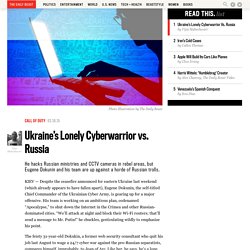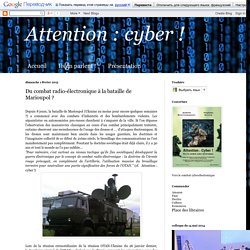

Ukraine’s Lonely Cyberwarrior vs. Russia. Jony Ive’s garage has clues to the design of his most ambitious project ever, but Airbus shows how it will actually be made.

Like millions of other tech-challenged people I have been waiting for Apple to crash through the layers of buttons on a TV remote…waiting and waiting and waiting. If anyone could bring one-click simplicity to the original home screen it should be the people in Cupertino who bring clarity of function and design to our computers, tablets and cell phones, right? It just shouldn’t involve three separate remotes to play a Blue-Ray movie, stream Netflix or record stuff for future viewing – three separate remotes each with its own strange hierarchy of keys and mystifying symbols. That’s why I was alarmed to see that Apple has been busy hiring lots of talent from the automotive industry with the idea of producing an iCar. Does this mean that an Apple fully integrated TV system has been abandoned? So let’s take a look inside his personal garage. Okay. Then I grew up. Les réseaux sociaux, l'autre front du conflit ukrainien.
Séparatistes et nationalistes investissent les plates-formes d'échange et notamment le réseau russe, Vkontakte.

Propagande et appels au combat s'y mêlent aux demandes d'entraide pour retrouver des disparus. En Ukraine, les villes de Marioupol et de Debaltseve sont le théâtre d'affrontements quotidiens. Un autre front occupe existe toutefois: celui des réseaux sociaux. Leur impact avait été important au début des manifestations à Kiev.
Un an plus tard, ils restent une place virtuelle des combats entre pro-Kiev et prorusses, tout particulièrement le Facebook russe Vkontakte. . • Un réseau d'entraide en Ukraine Pour certains Ukrainiens, le réseau Vkontakte est une «ligne de vie», assure le Wall Street Journal. Cyber ! : Du combat radio-électronique à la bataille de Marioupol ? Depuis 8 jours, la bataille de Marioupol (Ukraine au moins pour encore quelques semaines ?)

A commencé avec des combats d'infanterie et des bombardements violents. Les séparatistes ou autonomistes pro-russes cherchent à s'emparer de la ville. Si l'on dépasse l'observation des manoeuvres classiques au cours d'un combat principalement terrestre, certains observent une recrudescence de l'usage des drones et ... d'attaques électroniques. Si les drones sont maintenant bien ancrés dans les usages guerriers, les doctrines et l'imaginaire collectif de ce début de 21ème siècle, le brouillage des communications ne l'est manifestement pas complètement. Pourtant la doctrine soviétique était déjà claire, il y a 30 ans et tout le monde ne l'a pas oubliée...
" Hackers down German government websites - LiveBox. Cyber Operations by Private Actors in the Ukraine-Russia Conflict: From Cyber War to Cyber Security. Introduction Media attention to the ongoing Ukraine-Russia conflict has focused on a significant number of hacking and malware attacks by private actors, described in this Insight as cyber operations.

As an example, the pro-Russian hacker group CyberBerkut has assumed responsibility for cyber operations against NATO, the vote counting system for Ukrainian elections, and a mobile device within the U.S. vice-president’s delegation during a visit to Ukraine.[1] CyberBerkut does not mention support by Russia. Similarly, several security companies have found Russian roots in a number of cyber operations, without explicitly alleging Russia’s involvement or revealing the identity of their clients.
These recent developments reveal difficulties in applying traditional public international law rules and principles regarding state responsibility to cyber operations. The ASR and the Tallinn Manual Attribution of Cyber Operations by Private Actors to a State [10] Tallinn Manual, supra note 8, at 3–4. Pro-Russian cyberattacks bring down German government websites. The digital war over Ukraine isn't about to cool down any time soon.

A group of pro-Russian hackers calling itself CyberBerkut is taking credit for cyberattacks that brought down German government websites, including those for Chancellor Angela Merkel, the foreign ministry and the lower parliament. Officials aren't pointing any fingers, but CyberBerkut is claiming that the breach is in retaliation for German support of the "criminal regime in Kiev. " The attack came soon before German and Ukrainian leaders were going to meet, so the timing of the incident at least lines up with the group's motivations.
All of the affected sites are back up as of this writing. However, the internet assault is a definite black eye for Germany -- its official websites cope with 3,000 cyberattacks a day, and this is the first sustained attack to make more than a brief dent in the country's armor. [Image credit: Johannes Eisele/AFP/Getty Images]